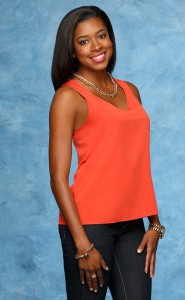
A rare sight: Chantel, a 27-year-old accounting manager — and black woman — is vying for the Bachelor’s heart.
I have watched more than a few episodes of ABC’s “The Bachelor” and “The Bachelorette” over the years. It isn’t a guilty pleasure. It’s the cost of having a fiancé who enjoys the program.
Tonight – the second of the show’s two-night premiere – bachelor Juan Pablo is scheduled to meet 25 beautiful women.
Get this: Juan Pablo is Hispanic, a native of Venezuela. One of his bachelorettes is African-American.
The rest of the cast looks awfully pale, which is par for the course for “The Bachelor” and “The Bachelorette” franchise.
Still, after all these years and episodes, racism and “The Bachelor” somehow never crossed my mind until Sunday night, when we met Juan Pablo and his extended family and were also given a sneak preview of the season – including one or two scenes featuring Chantel, a 27-year-old account manager from Miami who happens to be black.
A quick internet search reveals that “The Bachelor” doesn’t exactly boast a strong record of racial equality. In fact, two black men filed a lawsuit against “The Bachelor” and “The Bachelorette” in 2012, claiming that the shows’ producers discriminated against casting participants of color. (The case was later dismissed.)
Thus, a leading Hispanic bachelor and a black “contestant” could be viewed as racial progress for the series. (We shouldn’t expect Chantel to hang around for too long, though, as African-American women are typically the first to be booted off the show.)
Of course, if the program truly represented the fabric of America, it would include many more blacks, Hispanics and Asians. But don’t expect the white supremacy of “The Bachelor” or “The Bachelorette” to wane anytime soon.
First and most importantly, the discrimination case in 2012 was dismissed because casting decisions by the shows’ producers are protected by the First Amendment, and much of what we see on network television is still largely influenced by middle-aged white men. Only when the population of network television movers and shakers grows more diverse will our television programs follow suit.
Second, much of what we see on network television is largely influenced by ratings and demographics. It’s not venturing too far out on a limb to assume that the vast majority of The Bachelor/Bachelorette following is made up of middle class and rich white women who enjoy watching romance sprout between white men and women with whom they can relate.
Therefore, we can also reasonably assume the opposite, that over the dozen or so years of “The Bachelor”, black, Hispanic and Asian viewers lost interest in the series at some point – or never gained it to begin with – because of the limited casting of black, Hispanic and Asian men and women.
Ah-hah.
So if blacks, Hispanics and Asians aren’t even watching, we can also reasonably assume that they’re not jumping at opportunities to be casted on the shows either.
The Bachelor’s executive producer Mike Fleiss said this in April 2012: “We always want to cast for ethnic diversity, it’s just that for whatever reason, they don’t come forward. I wish they would.”
The solution to Mr. Fleiss’ conundrum is simple, of course: Make a concerted effort to recruit and cast minorities, attempt to give them more prominent roles and then sit back and watch as more diverse viewership and casting pools build.
But why tinker with a franchise when it is so popular and rakes in millions of dollars? And why risk alienating such a loyal army of white Bachelor followers?
If Fleiss was being honest, he would have said: “We don’t care about casting for ethnic diversity. All we care about is making money. And if that means utilizing a cast of white bachelors and bachelorettes, then that’s what we’ll continue to do.”
Here’s hoping for a Juan Pablo-Chantel love match. Stay tuned (well, only if you’re white, of course).